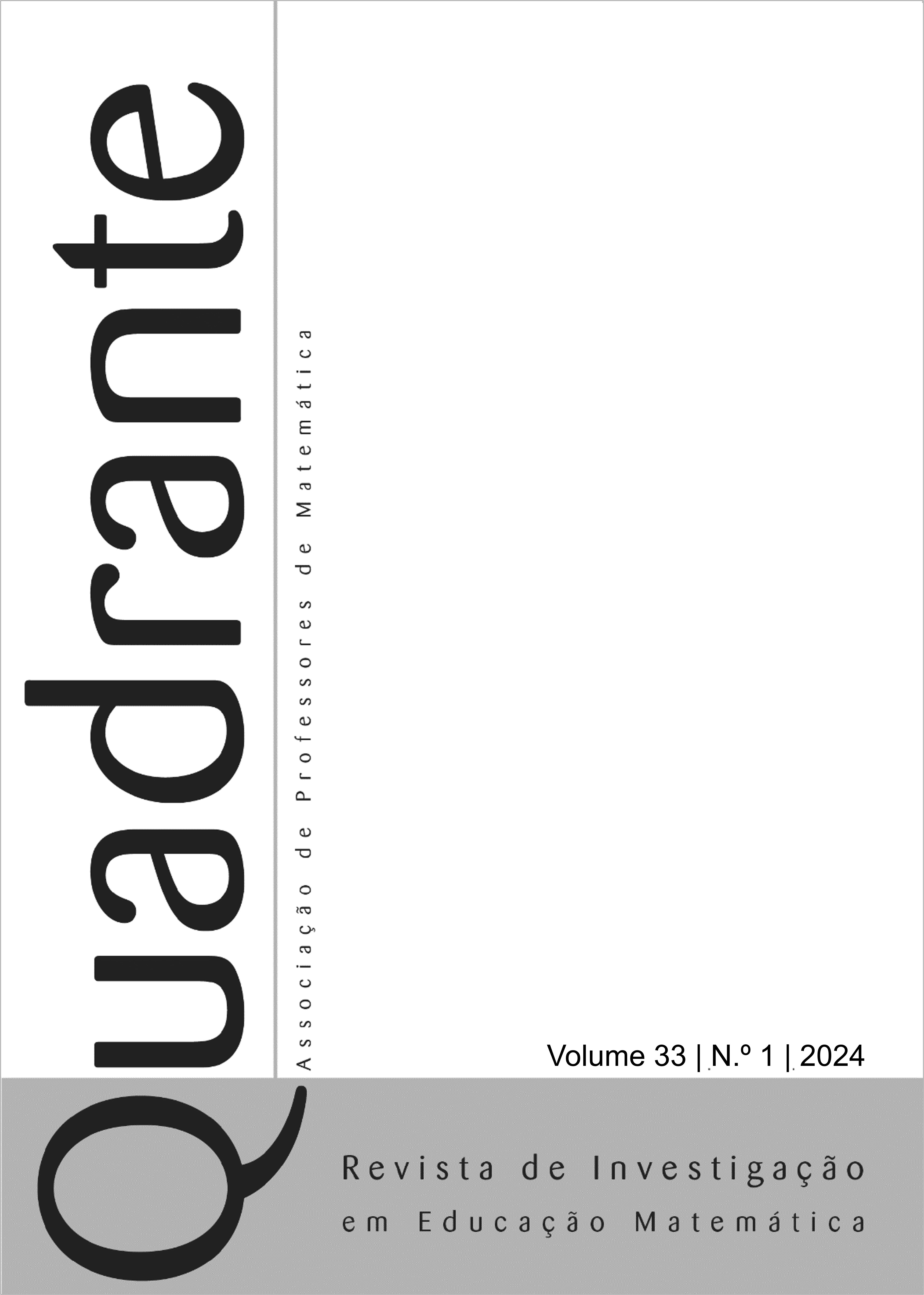Professional learning on early algebraic thinking in a community of practice
DOI:
https://doi.org/10.48489/quadrante.35230Keywords:
teachers’ continuous education, community of practice, teacher professional development, early algebraic thinkingAbstract
This article aims to reflect on the contributions of a continuous education process, in the context of a community of practice (CoP), to the construction of teachers’ professional knowledge on algebraic thinking of children aged 6 to 10 years old. The CoP was formed by the teacher educator and 21 teachers from a municipal education network in Mato Grosso, Brazil. The education process took place in 2021, in a hybrid format, with online and face-to-face meetings. The data produced were selected and discussed through discursive textual analysis, considering the processes of negotiation of meanings that occurred in the CoP, enabling professional learning among the members. The results revealed that a CoP constituted under the common interests of teachers and whose practice takes place in and for their teaching practice, enhances mutual engagement and participation, as well as adherence to negotiation of meanings, encouraging the learning of professional knowledge and the (re)signification of the practice itself.References
Amado, N. (2017). Participação numa constelação de práticas: iniciação dos professores de matemática à profissão docente. Revista Educação Matemática em Foco, 6(2), 149-173. https://revista.uepb.edu.br/REM/article/view/1994/1608
Ball, D. L, Ben-Peretz, M., & Cohen, R. B. (2014). Records of practice and the development of collective professional knowledge. British Journal of Educational Studies, 62(3), 317-335. http://dx.doi.org/10.1080/00071005.2014.959466
Ball, D. L., & Cohen, D. K. (1999). Developing practice, developing practitioners: toward a practice-based theory of professional education. In G. Sykes, & L. Darling-Hammond (Eds.), Teaching as the learning profession: handbook of policy and practice (pp. 3-32). Jossey Bass.
Blanton, M., & Kaput, J. J. (2005). Characterizing a classroom practice that promotes algebraic reasoning. Journal for Research in Mathematics Education, 36(5), 412-446. http://dx.doi.org/10.2307/30034944
Bogdan, R., & Biklen, S. (1994). Investigação qualitativa em educação: Uma introdução à teoria e aos métodos. Porto Editora.
Brasil. (2018). Base Nacional Curricular Comum: educação é a base. Brasília, MEC. http://basenacionalcomum.mec.gov.br/images/BNCC_EI_EF_110518_versaofinal_site.pdf
Cyrino, M., & Baldini, L. (2017). Ações da formadora e a dinâmica de uma comunidade de prática na constituição/mobilização de TPACK. Educação Matemática Pesquisa, 19(1), 25-48. http://dx.doi.org/10.23925/1983-3156.2017v19i1p25-48
Cyrino, M., & Jesus, C. (2014). Análise de tarefas matemáticas em uma proposta de formação continuada de professoras que ensinam matemática. Ciência & Educação, 20(3), 751-764. http://dx.doi.org/10.1590/1516-73132014000300015
Ferreira, M., Ribeiro, C. M., & Ribeiro, A. J. (2016). Álgebra nos anos iniciais do ensino fundamental: primeiras reflexões à luz de uma revisão de literatura. Educação e Fronteiras On-Line, 6(17), 34-47. http://ojs.ufgd.edu.br/index.php/educacao/article/view/5785/2948
Ferreira, M., Ribeiro, C. M., & Ribeiro, A. J. (2017). Conhecimento matemático para ensinar álgebra nos anos iniciais do Ensino Fundamental. Zetetiké, 25(3), 496-514. https://doi.org/10.20396/zet.v25i3.8648585
Kaput, J. J. (1999). Teaching and learning a new algebra. In E. Fennema, & T. A. Romberg (Eds.). Mathematics classrooms that promote understanding (1st ed.), (pp. 133–155). Routledge.
Kaput, J. J. (2008). What is algebra? What is algebraic reasoning. In J. J. Kaput, D. W. Carraher, & M. Blanton (Eds.), Algebra in the Early Grades (pp. 5-17). Routledge. https://doi.org/10.4324/9781315097435
Lave, J., & Wenger, E. (1991). Situated learning: legitimate peripheral participation. Cambridge University Press. https://doi.org/10.1017/CBO9780511815355
Leclerc, M., & Labelle, J. (2013). Au coeur de la réussite scolaire: communauté d’apprentissage professionnelle et autres types de communautés. Éducation et Francophonie, 41(2), 1–9. https://doi.org/10.7202/1021024ar
Luna, A., & Souza, C. (2013). Discussões sobre o ensino de álgebra nos anos iniciais do Ensino Fundamental. Educação Matemática Pesquisa, 15(4), 817-835. https://revistas.pucsp.br/index.php/emp/article/view/17747
Marcelo, C. (2009). Desenvolvimento profissional docente: passado e futuro. Sísifo. Revista de Ciências da Educação, 8, 7-22. http://sisifo.ie.ulisboa.pt/index.php/sisifo/article/view/130/218
Moraes, R., & Galiazzi, M. (2016). Análise textual discursiva (3ª ed.). Editora Unijuí.
National Council of Teachers of Mathematics. (2000). Principles and standards for school mathematics. NCTM.
Passos, C., Nacarato, A., Fiorentini, D., Miskulin, R., Grando, R., Gama, R., Megid, M., Freitas, M., & Vieira de Melo, M. (2006). Desenvolvimento profissional do professor que ensina matemática: Uma meta-análise de estudos brasileiros. Quadrante, 15(1-2), 193-219. https://doi.org/10.48489/quadrante.22800
Ponte, J., & Branco, N. (2013). Pensamento algébrico na formação inicial de professores. Educar em Revista, 50, 135-155. http://dx.doi.org/10.1590/S0104-40602013000400010
Shulman, L. S. (1986). Those who understand knowledge growth in teaching. Educational Research, 15(2), 4-14. https://doi.org/10.3102/0013189X015002004
Shulman, L. S. (1987). Knowledge and teaching: foundations of the new reform. Harvard Educational Review, 57(1), 1-22. http://dx.doi.org/10.17763/haer.57.1.j463w79r56455411
Silver, E. A., Clark, L. M., Ghousseini, H. N., Charalambous, C. Y., & Sealy, J. T. (2007). Where is the mathematics? Examining teachers’ mathematical learning opportunities in practice-based professional learning tasks. Journal of Mathematics Teacher Education, 10, 261-277. https://doi.org/10.1007/s10857-007-9039-7
Smith, M. S. (2001). Practice-based professional development for teachers of mathematics. NCTM.
Trivilin, L., & Ribeiro, A. (2015). Conhecimento matemático para o ensino de diferentes significados do sinal de igualdade: Um estudo desenvolvido com professores dos anos iniciais do ensino fundamental. Bolema, 29(51), 38-59. https://doi.org/10.1590/1980-4415v29n51a03
Wenger, E. (1998). Communities of practice: Learning, meaning and identity. Cambridge University Press.
Wenger, E., McDermott, R., & Snyder, W. (2002). Cultivating communities of practice. Harvard Business School Press.
Downloads
Published
How to Cite
Issue
Section
License
Copyright (c) belongs to Quadrante. Nevertheless, we encourage articles to be published in institutional or personal repositories as long as their original publication in Quadrante is identified and a link to the journal's website is included.










